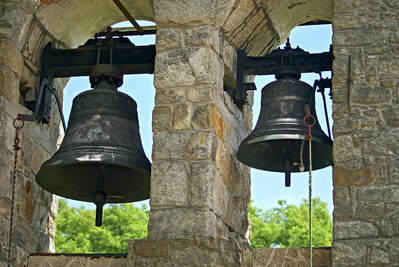all of the selves we Have ever been
 The sun might come up tomorrow, but I’m not betting my bottom dollar on it. I’ll call it a maybe and pencil it in. If tomorrow does come, I’m booked. And that goes for next year and someday too. There’s a lot on my schedule--a lifetime of appointments that I put off until tomorrow. Sometimes my delay tactics reflected a lack of time or resources, sometimes dread or fear. My recipe for procrastination was perfected with some added doubt and a mega dose of the most dangerous risk factor of all—“I don’t feel like it.” I wish I had kept the list, but tomorrow’s calendar grew too many pages. I would like to go back and take a look at yesterday’s tomorrow to-do list. How many things didn’t matter? How many did? Which day was the today that my ship sailed without me? And which was the day it came in? Which was the day that by waiting for tomorrow, turned out to be my lucky day—a life changing day? Would the fortunate days balance all of the missed opportunities? What was the special calculus I should have applied when choosing what to defer until tomorrow? When we were children, it seemed like tomorrow would never come. My siblings and I would whine about the daily calamities. We could not wait for tomorrow when we would be grown up and boredom, rules, chores, and bedtimes would be erased right along with the homework. As we carried on about the latest injustice of youth, our mother would say, “Don’t wish your life away.” Of course, that was easy for her to say, she could stay up past nine o’clock. Didn’t she understand that while we were chained to our bunk beds before the sun went down, men were walking on the moon? There were new horizons. We needed to get moving and fast. We summoned the heavens for favor: “Liberate us from today.” And then the sky did become the limit. We had grand plans as teens and young adults. The sky turned out to be a big place with no road signs. We didn’t always know the way, but we could do what we wanted. About middle age, we began to realize that we might have been better off had we retained a more experienced driver. We missed a lot of turns and ran red lights. We drifted into oncoming traffic. But we lived to tell about it. Constant demands shielded us from regret. And then somewhere along the way to growing old, tomorrow lost its urgency. Our hair grew thin from being blown back. Our teeth needed caps after all the worry we chewed on. Rotator cuffs gave out from shouldering the weight, and our knees buckled and ached from running marathons. I find that I prefer to stroll now. It’s back to early bedtimes, and it seems like a new day is here before I’ve closed my eyes. Tomorrow is the day when all of the forces will align. It is the day we will understand everything and come prepared. Tomorrow is the day we can write our list in permanent marker. I think that is called heaven. I pencil it in.
0 Comments
 “Mom, I hear her!” At the insistence of my seven-year-old son, we follow the laughter into the next aisle. But it is not her. It could not have been. She was murdered a few weeks before—a teenage girl with a life full of promise and a chest full of gunshot. A paranoid and obsessed boyfriend took her down in her own apartment. Her parents heard the news on the car radio while driving to work. And yet, here she is--a niece, a cousin--in Wal-Mart, aisle four. Attention shoppers! For a moment, she returns to us in notes of laughter, a song that should have been hers but wasn’t. Feelings of unreality, yearning, and hope unite with memory. Does she message us from heaven? *** I busy myself at my desk, peering intently into a computer screen. Suddenly, I smell her. “Sita? Is that you?” I follow the scent into the kitchen. But it is not her. It could not have been. She died 57 years ago from complications of diabetes. Three thousand miles away, my family got the call. And yet, here she is—a beloved grandmother—in my tiny galley kitchen. For a moment, she returns to me in the scent of lentils simmering on the stove. Lentils--a food we ate so often in her home that they became the eternal fragrance of her flesh. Is this comfort in a pandemic? *** It is midnight. We are watching Johnny Carson when the bells clang at the village church nearby. Across the living room, I see my aunt sit up straight in the recliner chair. Her body stiffens. “Can it be?” I follow her to the front door. We look outside. Never have I heard these church bells ring. My aunt tells me that the ringing ceased when World War II ended. With no more casualties of war to report, the bells went silent. And yet, here we are—in a town where families still grieve over soldiers lost, remains unreturned. On this dark, still night, is a son reaching back from the ashes of war to say I am found? *** Are they here? Or are these experiences sensory tricks played on suggestible minds? Are the heightened emotions and tensed muscles products of overactive imaginations? If so, explain that to the preschool child in foster care who collapses in grief at the smell of baking bread. He carries a burden of grief for a mother he can no longer name, a face he cannot recognize. And yet, her love reaches out to him through an oven door. *** No, these occurrences are not imaginings. They are more than the prosthetic memories produced by cell phones and machines, more than Hollywood special effects. They are not images distinct from our own beings. These special occasions are rememberings. Through a cosmic miracle, the remembered are present, a presence that is real though invisible in the same way that a giant sequoia is fully present inside a tiny seed. In these moments of remembering we are equally present and engaged with those we have loved. In his book, Remembering, Edward Casey wrote that remembering happens both WITH and IN the lived body. “…we come back to the things that matter.” Casey describes his own nostalgia for these experiences: “it is insofar as they are unrepeatable that these remembered times beckon so movingly and powerfully to me in the present.” In my own moments of remembering, I understand why the ancients believed in spirits and an afterlife and why those beliefs have persisted for thousands of years. The words of the Old Testament tell us that the giants of those Bible stories were “gathered to their people” when they died. I am grateful for rememberings-- when my people gather here for me.  The English language can be slippery, and a lot of words sound alike. I sometimes find myself living in a parallel universe with others who share my space. Younger people think that older people can’t hear. That’s not my problem. I don’t need volume; I need context. And maybe a little less background noise. I experienced a classic case of such confusion a couple of years ago after I was recruited for a two-year contract job in Missouri. I pared down my possessions to just what would fit in my car and started driving. I knew no one in Missouri. I sublet an apartment and settled in. I loved the small rural community with its two main streets and slower pace of life. Everything I needed was clustered within three miles of my home. The welcoming culture of the town and its conveniences were a nice relief from the aggressive traffic and harried pace of the big city I left behind. This could be home. One sunny Saturday morning I set out on routine errands. I did not get far before I saw flashing lights and slowing traffic. As I inched toward the scene, I could see that a car had driven through a storefront. Crumbling bricks and shattered glass filled the parking lot where a vape shop once stood. The sight of a car’s rear end sticking out of a collapsing building was peculiar enough, but what was even stranger? It was the second such accident I had seen in less than a week. What have I gotten myself into? I called a co-worker who was a new friend to tell her what I had witnessed. My friend was not aware of the fresh accident, but she seemed to know quite a bit about the earlier one. “Oh, yes! I heard Alexis drove through the window of the candle shop.” My friend said this as though Alexis was someone I should know. I checked off the names on my short mental list of people I had met in Missouri, but there was no one named Alexis. “Who’s Alexis?” I asked. “Not Alexis. A LEXUS,” my friend shouted into the phone’s receiver. “Oh!” Once we cleared that up, my friend proceeded to share another interesting bit of local gossip--some wrong perpetrated on Dee Dee. “Who’s Dee Dee?” I asked. “Not Dee Dee. THE DD. The DD Highway!” Oh, again. I thought this kind of conversation only happened on greeting cards, but my friend and I had a good laugh over it, and not just once. Our friendship was cemented by a case of mistaken homophones. If laughter is good medicine, it is also strong glue. It is inside jokes such as these that help to form the enduring bond of friendship. During the pandemic, my friend adopted a puppy and named it Alexis. Just to be clear, this Alexis was nowhere near the candle shop in 2019. It is now perfectly evident that Alexis is a pet and an out-of-control Lexus can do a lot of damage to a storefront. Thankfully, a couple of poor gals named Alexis and Dee Dee did not end up serving time for crimes they did not commit. I think we can agree that I should never enter a court of law to provide testimony based on hearsay. I returned to Ohio just ahead of the pandemic. Cars protruding from collapsing buildings now seem like a minor social problem compared to disease and conspiracy theories. Confusion is everywhere, and troubling news easy to come by. Some of the news is so strange, in fact, that I find myself full of doubt and afraid to speak. Not everyone is a good friend who will find humor in auditory mix-ups. Today, it might even get me killed. And so, I find myself questioning everything: Is there a heroin problem in my community or a heroine problem? Given the current state of politics and reports of corruption at the Columbus Zoo, is it guerilla warfare I should fear or gorilla warfare? If someone tells me that a hummer interrupted the school’s choir performance, should I call a tow truck or the principal? It’s all too much—a classic case of homophonophobia. And to whom should I turn for treatment? A Colonel of truth perhaps.  I see a lawn tractor ahead. The contraption is so loud that it sucks me into its sphere and deafens me to the whooshing sounds of passing highway traffic. Even my own thoughts drown in the cacophony. A spray of dead clippings showers the asphalt walking path. As I step among the grassy remains, I witness a resurrection. One-by-one dandelions spring up in the mower’s wake. They rise tall and regal in this field of stubby grass. Brilliant and moist, their lives are a sharp contrast to the brown and lifeless trimmings that cover my shoes. Like golden-haired ballerinas, the dandelions know just when to bow and when to rise for an encore. I laugh out loud as each milk-filled stem unfurls and reaches toward the sun. This troupe of tiny dancers has outwitted both man and machine. I doubt that these sassy blossoms ever considered succumbing to the executioner’s blade. Dandelions have work to do. They are every man’s flower, a poor man’s medicine, a starving man’s food. Despite war and climate change, the rise and fall of civilizations, dandelions have been going strong for 30 million years. More recently, they immigrated to this country aboard the Mayflower along with our Pilgrim ancestors. While adults may have forgotten the dandelion’s proud heritage and may call the humble bloom a weed or a pest, little children are still capable of awe. They can see the beauty in a simple thing without cataloging its faults. Despite adult efforts to eradicate them, dandelions are loved by children. A child’s love trumps pesticides, and, I believe, turns these flowers into masters of survival. Just the right size for small, chubby hands, dandelions are everywhere and within a child’s reach. These common flowers are not temperamental like orchids or thorny like roses. Generous bouquets can be gathered at no expense and proudly offered to people loved. Small bouquets fill teacups that adorn countertops and kitchen tables. Blossoms are jewels to be woven into crowns and necklaces. Colorful “stews” are concocted inside tents and treehouses. Magic wishes travel on puffs of dandelion seeds. Dandelions are a child’s birthright. They deliver a message of hope that life is abundant, persistent, and renewable. How else could a child survive? All of these thoughts fill my mind as the noise of the lawn tractor fades. Nature is a miracle. How does something so small, so ordinary, contain so much strength, agility, patience, and resilience? It is my turn to bow. I honor the dandelions as I pass. They are the heralds of spring, the rebirth I hungered for during the pandemic winter. The flowers comfort me with their familiarity and remind me that life goes on. In a time of shortages, they reassure me with their effortless abundance. When I die, bury me under a blanket of audacious dandelions gathered by the sweet, chubby hands of true believers. Send me down into the earth to mingle with these enduring roots. |
AuthorLilli-ann Buffin Archives
July 2024
Categories
All
|
 RSS Feed
RSS Feed